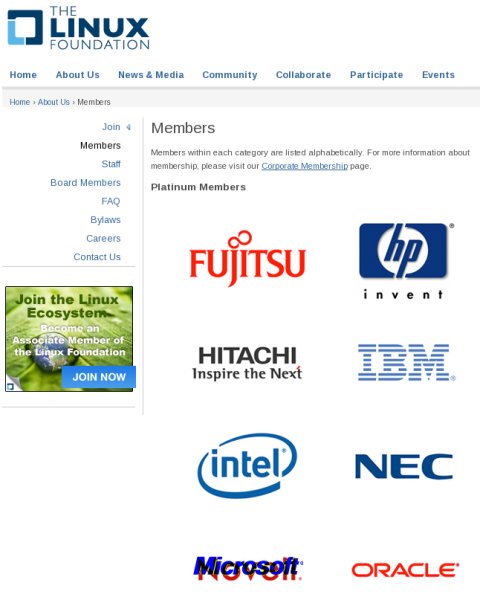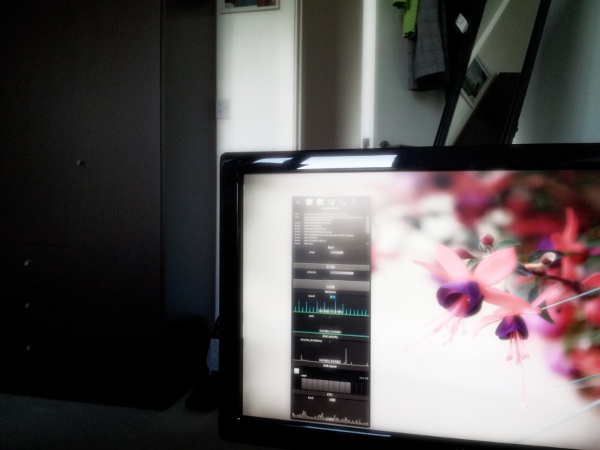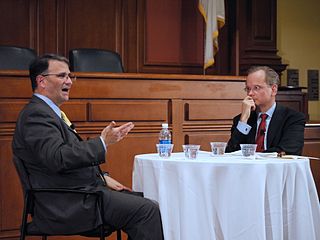11.14.13
Posted in Microsoft, Mono at 4:10 am by Dr. Roy Schestowitz
Microsoft’s mole in the GNU/Linux world

Summary: Xamarin climbs up to Ballmer’s bed again, showing everyone that Mono is everything to do with Microsoft, not FOSS
OVER THE years the Mono project got closer and closer to Microsoft, up to the point where Mono code was from Microsoft itself, bearing Microsoft software licences. The funding behind Mono was tied to Microsoft, too. That’s just the tip of the iceberg and there is a lot more in our Wiki pages about Xamarin and the Microsoft MVP Miguel de Icaza. Based on articles from all the usual suspects (those who regularly give Mono some coverage), .NET lock-in is “cross-platform” (Paul Krill says so) and also, “Xamarin, the company driving the development of the Mono open-source .NET framework that is generally loved or hated by Phoronix readers, has announced a new partnership with Microsoft.”
Microsoft’s booster Peter Bright is already doing some public relations for his beloved Microsoft and other Microsoft circles seem to care about this more than GNU/Linux-oriented sites.
“De Icaza endorsed Microsoft’s Office Open XML (OOXML) document standard…”
–WikipediaMono is a Microsoft pet project. It is worth noting that Gnote, which replaces a Mono project that infected GNOME-based distributions, is almost superseding it now [1], so Mono seems to be on its way out of the GNU/Linux world.
According to Wikipedia, “De Icaza endorsed Microsoft’s Office Open XML (OOXML) document standard,[11][12][13] disagreeing with a lot of the widespread criticism in the open source and free software community.
“He has also been a longtime advocate of using Mono – a free software implementation of Microsoft’s .NET Framework – in GNOME.[14] This has raised much disagreement due to the patents that Microsoft holds on, and related to, the .NET Framework.
“For advocating Microsoft technologies, de Icaza was criticized by Richard Stallman on the Software Freedom Day 2009 as “Traitor to the Free Software Community”.” █
Related/contextual items from the news:
-
The GNOME developers announced a few days ago the immediate availability for download and testing of the first development release towards the Gnote 3.12 application.
Permalink
 Send this to a friend
Send this to a friend
Posted in Action at 3:52 am by Dr. Roy Schestowitz
Photo by Sebastian Widmann (AFP)

Abducted by the CIA in Germany, tortured, threatened with death, found to be innocent (background)
Summary: The growing concern about secret torture which is increasingly being used as a weapon against dissent in the US
IN RECENT years, as daily links in Techrights became a little more ‘political’ (not right versus left), the subject of torture was frequently alluded to or fully covered. Torture — like slavery — is not gone from this world. It just morphed a little.
We wish to draw readers’ attention to the development of new torture techniques by the United States [1]. Yesterday was Guantánamo’s 12th anniversary and as someone who is high up reminds us [2], “[o]ut of 779 detainees, only seven have been convicted and sentenced,” so we know it’s not a matter of torturing the guilty. To make matters worse, the CIA was torturing people right here in Europe and now that there is political scrutiny they seek secrecy [3]. Johnson, one of the activists against the NDAA (which makes the same rules applicable to US citizens), says [5] that the “loaded gun pointed at Afghanistan,” combined with the NDAA, “was the same gun pointed at the United States.” Notable people in the US seem to become more politically aware and some quit their job because of it [6].
Today, committing a minor crime can lead to small retribution [6], but some day in the future it may also lead to assassination by drone, indefinite detainment, and torture. It’s now pretty much legal to do all these things to US citizens too )on US soil too), so citizens need to rise up and do something about it. █
Related/contextual items from the news:
-
-
Out of 779 detainees, only seven have been convicted and sentenced. The US must end this costly disgrace
-
Poland’s government has asked the European Court of Human Rights to exclude the media and the public from a court hearing on whether Poland hosted a secret CIA prison on its territory.
The request for a private hearing was criticised by a Polish human rights group, which accuses the state of trying to conceal its involvement in the CIA’s “extraordinary rendition” programme behind a veil of secrecy.
-
Likening the Authorization for Military Use of Force Against Terrorists as a loaded gun pointed at Afghanistan, Johnson said the NDAA was the same gun pointed at the United States.
-
The AP notes that Moffit’s worldview changed after reading the works of the Dalai Lama and Chomsky over the last few years while in school.
-
People like Luis Rivera are being locked out of the formal workforce forever thanks to one youthful mistake.
Permalink
 Send this to a friend
Send this to a friend
Posted in Kernel, Microsoft, Virtualisation, VMware at 3:27 am by Dr. Roy Schestowitz

Summary: Nicolas (Neela) Jacques is appointed by the Linux Foundation to be Executive Director, overseeing efforts that involve GNU/Linux vendors
MICROSOFT ENTRYISM is a serious problem. We already know what impact it has had on Yahoo! and Nokia. Microsoft also occupied VMware after EMC’s Tucci foolishly let Ballmer do this (almost all the top executives were Microsoft executives bringing in former colleagues). The Ubuntu project too is now steered by a former Microsoft employee (who still lives in Seattle, just like Elop) as the project angers more and more people [1, 2].
Among the VMware managers who are former Microsoft employees there is this guy who, after the Linux Foundation let Microsoft get closer (to OpenDaylight), becomes the Executive Director. “Until now, the OpenDaylight Project has not had its own Executive Director, but that has changed,” says this article. So now we have a former Microsoft manager in charge of a Linux Foundation initiative. Wonderful! What could possibly go wrong? █
Permalink
 Send this to a friend
Send this to a friend
11.13.13
Posted in Intellectual Monopoly at 11:20 am by Dr. Roy Schestowitz
Thank you, Wikileaks

Summary: Learning what the Trans-Pacific Partnership (TPP) is about (basically a corporate land grab of global scale) is now possible
A FEW months ago, the victims of TPP (who are over 99% of the world’s population) got hold of the leaked file from TPP negotiations, Wikileaks-secret-TPP-treaty-IP-chapter.pdf. Like Cablegate before it, this leak shows serious corruption. It shows how corporations are capturing political systems all around the world in order to provide themselves with protectionism. Glyn Moody told me a few hours ago: “it would be great to get this out to your networks – http://keionline.org/node/1825 they don’t want people to know what’s in TPP…”
Here some shorter analysis from KEI for those who haven’t time to read the whole thing. For the uninitiated, here is a video where Noam Chomsky explains what TPP is about. We’ll continue to post links about TPP and urge readers to fight TPP like a plague. █
Permalink
 Send this to a friend
Send this to a friend
Posted in GNU/Linux, Kernel, Tivoization at 11:07 am by Dr. Roy Schestowitz

Summary: Linux gets injected into it some code that potentially ties software to hardware (in the lock-in sense)
Based on antitrust exhibits, Intel’s relationship with Microsoft is complex, but Intel generally uses Windows to keep the Wintel cash cow going. Earlier this year I spoke to Intel employees who run the UEFI Forum (a forum decorated by some more members who help distract from the real dominating force) and I tried to be polite and constructive, advising the head of this forum to withdraw ‘secure’ boot. I didn’t bring up the fact that his employer, Intel, is a criminal company whose former staff plays a big role in parasites like Intellectual Ventures. I just pointed out that my brother in law works for Intel and that perhaps Intel can be changed for the better. But that was too optimistic. The utter mess which is UEFI ‘secure’ boot (harming hardware, not just computing freedom) goes forth and despite the fact that it is bricking devices with Windows on them (apparently things are getting even worse [1]), Linux developers let that nonsense enter the kernel, specifically for ARM [2], where so-called ‘secure’ boot cannot even be disabled.
“This is like another Tivoization taking place and Linux Torvalds, who spoke out against UEFI ‘secure’ boot, will probably just find some excuses for letting it be.”This is probably happening because Intel funds the Linux Foundation. UEFI Forum is Intel is Linux Foundation (in part). That’s how the influence of money works. This is like another Tivoization taking place and Linux Torvalds, who spoke out against UEFI ‘secure’ boot, will probably just find some excuses for letting it be. The situation is similar when it comes to the W3C (Linux Foundation equivalent), where corporate members (like Intel/UEFI Forum) push DRM into the Web while the founder, Tim Berners-Lee, just lets it be, essentially forcing everyone to just swallow the poison, even good forces like Eich/Mozilla [3].
The head of the UEFI Forum mocked or at least dismissed DRM as just for “business models”, but his employer promotes DRM. UEFI ‘secure’ boot — like DRM — is just about business models, so who is he kidding? Likewise, Berners-Lee has many reasons to dislike DRM given his historical background (he created the Web to share his work), yet he keeps defending DRM right now [1, 2, 3]. Are these people thinking for themselves or are they all just blindly/reluctantly following orders of those who pay their salaries? Rather than protect copyright monopolies in their respective areas (which is why the monopolies try to use DRM on the Web) or protect the monopoly of software crooks (who use bribe and sabotage to hold back GNU/Linux) perhaps those influential people should make a brave stand and rise up against corporate takeover, spilling some beans or using public humiliation to drive away the lobbyists. █
Related/contextual items from the news:
-
And then, there’s the celebrated Microsoft update to convert your Windows 8 RT computer into a Windows 8.1 RT… brick! It went so bad that Microsoft had to prevent people from installing it.
I don’t know if they fixed it but, according to this post, the update to Win 8.1 now seems to convert your computer into a cat (because it does not play nicely with mice).
-
While EFI was originally developed by Intel and largely targeting x86 platforms, the EFI 2.3 specification does exist for Itanium and ARM architectures too and early this year the UEFI Forum had shown a proof-of-concept UEFI boot environment for ARMv8. With the EFI pull for the Linux 3.13 merge window, the Linux EFI support extends to ARM.
-
If I didn’t before, after talking to Eich I had a strong sense that Mozilla is constrained by conflicting desires – to do the right thing, for example, while retaining enough browser share that it remains able to do the right thing. As you might expect, there are no easy solutions. Fortunately, things seemed more hopeful regarding another topic we discussed: I’ll be exploring that in my next column.
Permalink
 Send this to a friend
Send this to a friend
Posted in Apple, Deception, Google, Microsoft, Samsung at 9:59 am by Dr. Roy Schestowitz

Surveillance Don James R. Clapper back in his military days
Summary: Popular manufacturers of phones (and software platforms for phones) say that they cannot track switched-off phones, but they are lying using carefully-crafted statements
TECHRIGHTS is no friend of Nokia and Samsung, especially after what they did with Microsoft (regarding patents and beyond), but today we deal with a completely separate issue. It’s irrespective of brands. There is a lot of media hype (even brainwash) — accompanied at times by expectations from employers, peers, family and friends — to purchase and constantly carry a mobile (cellular) phone. I never really carried one, except in unusual circumstances (e.g. when going somewhere dangerous or an important meeting).
Well, as pointed out the other day, the thing about companies that say they can’t track switched off phones is that they are lying. They use semantics and wording that’s shrewdly designed to sort of say the truth while actually dodging the more accurate/well-targeted questions and the real issues (same as ‘cloud’ companies did after PRISM became public knowledge).
Leading companies in the mobile phones arena insist that they can’t track/listen to powered-down phones, but they can release updates which enable this, so in a sense they really can listen (they just need to take a step before doing this, it cannot typically be done directly). The phones cannot be switched off, they merely pretend to be powered down (mimicking this behaviour). There is a new article titled “Cell Phone Manufacturers Offer Carefully Worded Denials To Question Of Whether NSA Can Track Powered-Down Cell Phones” and it says the following: “Short of pulling out the battery (notably not an option in some phones), there seems to be little anyone can do to prevent the device from being tracked and/or used as a listening device. The responding companies listed above have somewhat hedged their answers to the researcher’s questions, most likely not out of any deference to government intelligence agencies, but rather to prevent looking ignorant later if (or when) subsequent leaks make these tactics public knowledge.
“Any powered up cell phone performs a lot of legwork for intelligence agencies, supplying a steady stream of location and communications data. If nothing else, the leaks have proven the NSA (and to a slightly lesser extent, the FBI) has an unquenchable thirst for data. If such exploits exist (and they seem to), it would be ridiculous to believe they aren’t being used to their fullest extent.”
“Apple’s devices are surveillance devices on steroids; they go a a long way (more than counterparts) to maintain the integrity of the eavesdropping functionality.”The problem is being downplayed, too. It’s actually a lot worse than just tracking. Phones with camera/s and microphone in them can also transmit images, video, and/or audio once they are converted into surveillance devices (carried by s/he who is surveilled and his/her surroundings). Earlier this year the Wall Street Journal released a report which says even Android is susceptible to this. The FBI exploits the back doors in order to take over microphones of Android devices.
I happen to be the only person I’m aware of who has been pulling batteries out of phones (inevitably reverting clock back to factory defaults) for a number of years now. I have written about this for a long time, but only after Snowden’s leaks can more people appreciate this. Removal of batteries is not “paranoid”. This ought to become more common a practice and everyone should be doing this, even if they “do nothing wrong” (we need to make it the norm if we are ever to impede abusive entities like the NSA). No phone that I ever touched or used had my name attached to it at the carrier. Never.
It is worth adding that Apple won’t even answer the questions. Apple is worse in many ways because it makes it virtually impossible to remove the batteries (sometimes there is more than one, and some may not be detachable). Apple’s devices are surveillance devices on steroids; they go a a long way (more than counterparts) to maintain the integrity of the eavesdropping functionality. Microsoft too is rather unique because there is no need to convert devices with Windows into listening devices; there are back doors there 'out of the box', which is hardly surprising because Microsoft and the NSA are in bed together. █
Permalink
 Send this to a friend
Send this to a friend
Posted in GNU/Linux at 9:27 am by Dr. Roy Schestowitz

My wife’s computer
Summary: Myth-busting regarding the difficulty — or lack thereof — when moving to GNU/Linux on the desktop
EVERYONE in my family (parents, siblings) is using GNU/Linux or has used it in the past. It is not hard; Android is used by almost everyone, but on the desktop too I never really encountered serious support-related issues/questions. So this new article from Life Hacker [1] irked me somewhat. It basically shows some screenshots very selectively and pretends that with Windows there can never be technical challenges (let alone routine complications like viruses, fragmentation, bad patches, lack of software repositories, lack of functionality on the desktop, restarts, freezes and the list goes on and on). Based on my experience, people choose to switch to GNU/Linux because Windows becomes a big mess requiring a lot of technical support, not because they are after a platform which is more complicated and technical. The motivations are technical, not idealogical. My wife uses KDE with multiple desktops, a clipboard stack (through Klipper), bash terminals, and ssh. These are not too hard to grasp, it just takes a bit of adjustment. Those four features are not even basic features, and they aren’t accommodated at all by Windows (in GNU/Linux these are all built in). There is one particular article [2] titled “Confessions of a 40 year old virgin”. Published only a few days ago, the article explains what a new GNU/Linux user may have to go through. It’s nothing too daunting. Slackware 14.1 was released some days ago [3] and it surely targets veteran users of GNU/Linux. It doesn’t need to create a stereotype about the level of difficulty of GNU/Linux, which is basically a stack that suits everyone, provided a suitably simple/advanced desktop front end. Point Linux 2.2 is another distribution which has just come out [4] and it goes a long way in simplifying things; to quote the new review, “Point Linux gives you the ability to watch Flash videos (and play games) as well as listen to MP3s by default.” When it comes to installing new software, it is so much easier than Windows. The ending words of this review say: “Whilst Synaptic isn’t as glamourous looking as one of the many software centres out there it is incredibly functional and gives you full access to repositories.” █
Related/contextual items from the news:
-
In the end, Linux is great for a lot of things, even if you don’t use it as your main OS. It’s perfect for setting up a home theater PC without buying Windows, or reviving a super old machine. But if you want to really dig deeply and use it as your main operating system, just know that things are going to be a little different than Windows or OS X. For some, it’s well worth the effort, but others may find that it’s too much work for little payoff. The only way you can know is to try it out for yourself.
-
Well actually, to be more specific, I was a LINUX virgin who didn’t know the difference between Ubunto (yes, in that spelling!) and Mint. And DarkDuck helped me to ‘pop my cherry’. Now I think that I should stop with the lame sexual analogies before this gets downright weird.
[...]
DarkDuck, the owner of the above mentioned site, suggested that it was probably worth waiting for the latest version and I took his advice, opting for the 64-bit version. The disk arrived a couple of days after the release date for 13.10, and the installation was fast and painless. I found a few tips on the web about configuring the Firewall and so on and now the laptop is working again.
-
Yes, it is that time again! After well over a year of planning, development, and testing, the Slackware Linux Project is proud to announce the latest stable release of the longest running distribution of the Linux operating system, Slackware version 14.1!
-
Point Linux 2.2 is a welcome blast from the past with the way it looks. It reminds you of how good things were back when Gnome 2 was prominent.
The performance of Point Linux on the Toshiba Satellite Pro that I am using is excellent.
I didn’t come across any issues whilst using Point Linux and the experience has been really good.
There is one thing I would like to add though. If I could go back to any point in time in my past then it would be either the 1970s or the 1980s.
I like the 1970s because in my head it would be like “Life on Mars” and I like the 1980s because I have lived through it once already and life seemed easier back then.
The truth is the reason why I would be happy back in the 1980s is because I know what happened and during my 1980s nothing bad happened.
The same can be said of Ubuntu back at version 10.04. I used it. I remember it well. It was great, it was stable and I really liked it and I know nothing bad happened whilst I used it.
Is that a good enough reason to go back in time?
Unity, Cinnamon, Gnome 3. They have all added something new and they are clearly the future of Linux. (Ok KDE as well, if you must).
Point Linux is like a time machine. It gives me back a really good operating system which works in a way I used to work. Do I still want to work that way? I am not quite sure.
Taking it on face value, Point Linux is a really nice operating system that performs well, is easy enough to navigate and has no real major issues. If that is what you need then it is well worth a shot.
Permalink
 Send this to a friend
Send this to a friend
Posted in Apple at 8:41 am by Dr. Roy Schestowitz

Lessig giving Abramoff a platform, photo by Madeleine Ball
Summary: The man behind Creative Commons lays out a strong case for abandoning Apple, but stops short of abandoning Apple
Professor Larry Lessig, who recently became famous for using his Apple gear and Apple software to produce slides about political corruption, is unhappy about Apple censorship and right now he speaks out against technical problems with Apple products [1]. This is significant because it comes from one whose fascination with Apple stuff sort of conflicts with the spirit of Creative Commons, for which he is responsible. Maybe it’s time for him to embrace GNU/Linux and Free/libre software.
In other interesting news, the infamously pro-Apple Pogue, who piled criticism on Windows Vista way back in the days (showing it was just a ripoff of Mac OSuX), is now moving to Yahoo [2], despite the company shrinking further (firings of more than 600 people in recent weeks) after Microsoft did to it what it also did to Nokia. █
Related/contextual items from the news:
-
Every Apple-related product I use has been crippled in important ways.
-
David Pogue, the technology writer for The New York Times, whose columns were among the most popular at the paper, said on Monday that he was leaving for Yahoo to start a consumer-focused technology site.
Permalink
 Send this to a friend
Send this to a friend
« Previous Page — « Previous entries « Previous Page · Next Page » Next entries » — Next Page »


































 Content is available under CC-BY-SA
Content is available under CC-BY-SA